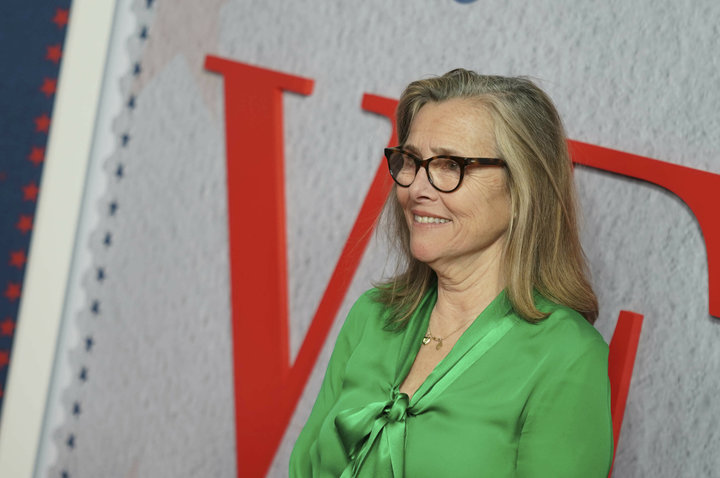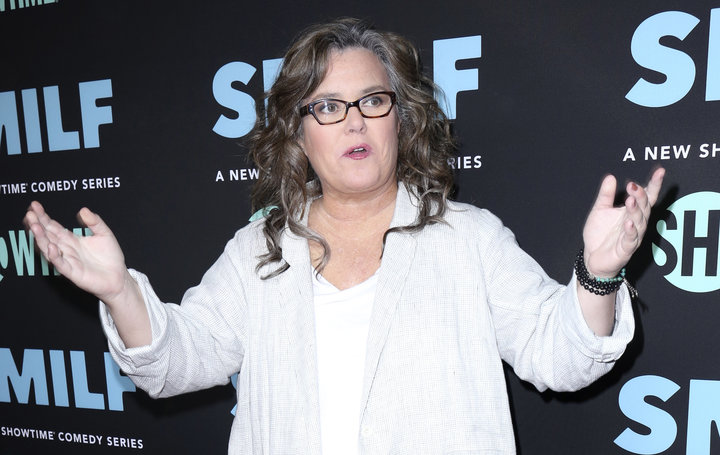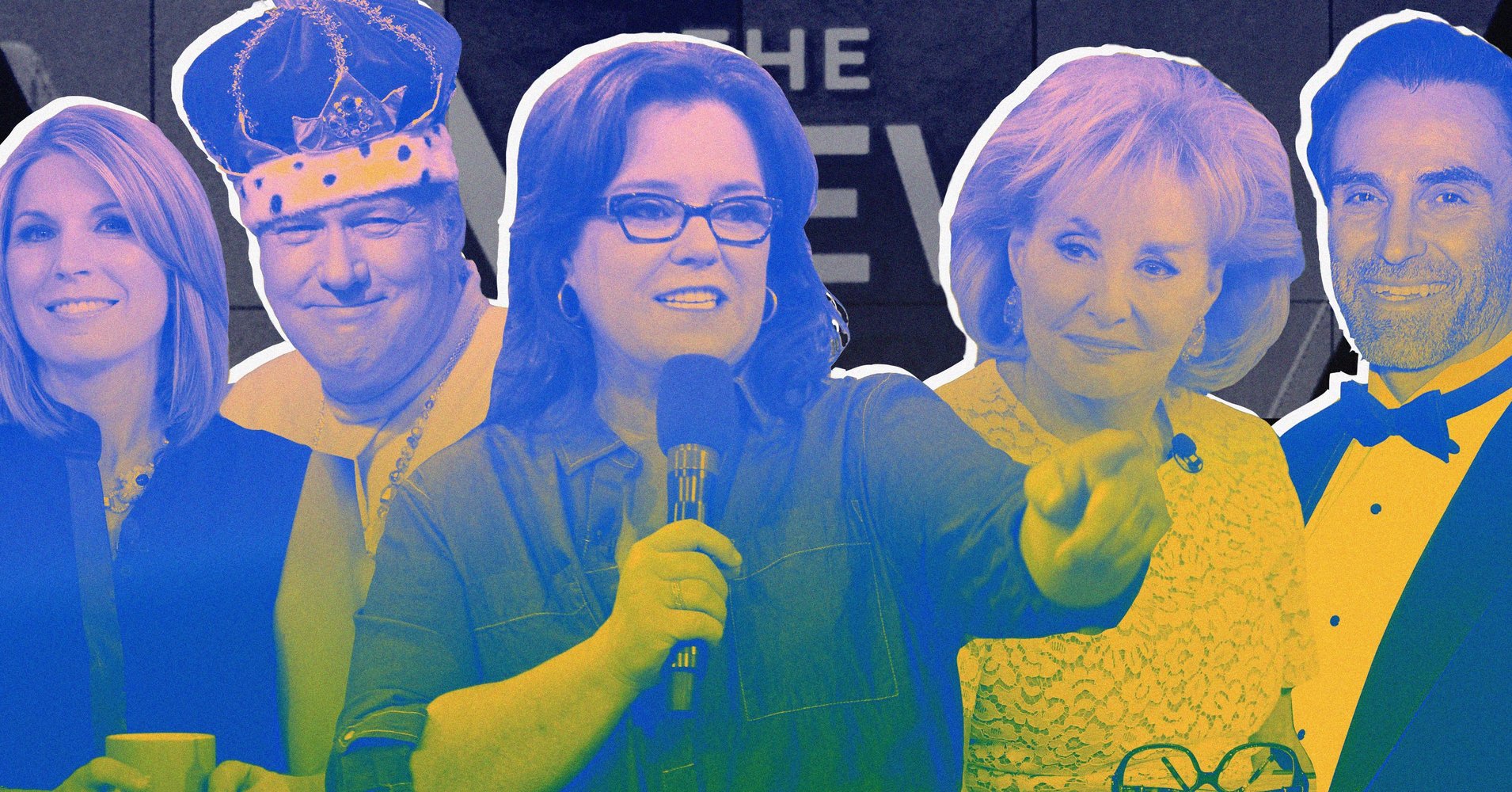[ad_1]
For years, the public has known that the ABC television program “The View” is a show (and a workplace) filled with drama and chaos. But a new book alleges a breathtaking level of workplace misconduct, unethical behavior and dysfunction behind the scenes of the top-rated television talk show.
The book, Ladies Who Punch: The Explosive Inside Story of “The View,” written by Ramin Setoodeh, the New York bureau chief of Variety, is packed with details about the show, which premiered almost 22 years ago. Setoodeh conducted 150 interviews for the book and sat down with all 11 of the show’s major co-hosts except for Elisabeth Hasselbeck and Whoopi Goldberg. The reporting also includes 2014 and 2016 interviews with legendary newswoman Barbara Walters, who created “The View” and held 50 percent ownership of it for some time.
Excerpts from Ladies Who Punch have been published by other news outlets, but HuffPost is the first publication to obtain a full copy of the book.
The book is unsparing in its portrayal of the co-hosts, producers, ABC executives and crew of the program. Walters is portrayed as a leader who understandably held a tight grip on the show, but was also deeply egomaniacal and threatened by women who are more popular (namely Joy Behar and Rosie O’Donnell). The book also alleges she actively participated in undermining current and former co-hosts by leaking embarrassing information to the press.
A theme emerges throughout the book: The power Walters held over the show (and the fact that the filming studio and offices were located in a different building in New York City than ABC’s headquarters) allowed workplace misconduct and dysfunction to thrive at the program. And despite the fact that ABC executives were aware of what was happening, the book describes how they repeatedly failed to put a stop to what was going on behind the scenes ― alleging they even participated in stigmatizing mental illness and brought back a host they knew was unquestionably abusive to staff and co-hosts.
ABC did not immediately respond to detailed list of questions about the allegations described in the book and this piece.

Ageism
In an interview for the book, former show moderator Meredith Vieira accused Bill Geddie, the executive producer of “The View,” of ageism.
Vieira told Setoodeh that when her contract with “The View” was up in 2006, she was dragging her feet and not re-signing. Geddie approached her to ask why she hadn’t committed, and then referenced the fact that she was 52 and may find it difficult to find work, according to Vieira. “The implication was it wasn’t easy to get another job. And I’m thinking “yes it is!” Vieira told Setoodeh.
Geddie subsequently apologized, Vieira told Setoodeh.
In his own interview, Geddie said he didn’t remember the comment. “I have no recollection of making any issue with her age. If she said I said it, maybe I thought it was a play. I was trying to get her to stay. I certainly wanted her to stay.”
Three sources inside “The View” told HuffPost that Geddie was known for taking a misogynistic tone on occasion in workplace conversations. He left “The View” in 2014 and is set to serve as the executive producer of former NBC “Today Show” co-anchor Tamron Hall’s ABC daytime talk show.
Human Resources
The book details more than 100 examples of a hostile work environment, yet it seems nothing was ever done to mitigate this behavior. Clashes backstage between staff and co-hosts, and between co-hosts and co-hosts, are detailed at great length.
The book describes a clash between co-hosts Nicolle Wallace (who now hosts her own successful MSNBC program) and O’Donnell. O’Donnell was a co-host of the program through two runs, the first in 2006-2007 and the second in 2014-2015. Wallace, who is also a former George W. Bush administration official, was a co-host in 2014-2015.
While O’Donnell and Wallace largely agreed with each other on screen, their relationship was acrimonious backstage, Setoodeh writes. O’Donnell’s anger often set off their clashes.
The book describes how O’Donnell was upset that Wallace defended former President George W. Bush on MSNBC’s “Morning Joe,” and O’Donnell blew up at Wallace backstage. Later, O’Donnell became enraged in another meeting, which led Wallace to report her to human resources.
O’Donnell told Setoodeh she was shocked that Wallace would report her to human resources “Are you kidding me? I raised my voice. I was in my dressing room, getting my makeup done, and somebody comes and goes, ’Nicolle Wallace just went to HR…” O’Donnell said.
O’Donnell added a telling detail that speaks to the lack of oversight at the show: “I didn’t know what HR was, first of all.”
O’Donnell also described Wallace bringing her husband to work that day to serve as a bodyguard of sorts. According to O’Donnell, Wallace told her, “I just felt you were threatening me.”
The book doesn’t say whether human resources ever followed up with O’Donnell or Wallace about the report.
O’Donnell and Wallace are friends now, Setoodeh says.

The book also describes a massive behind-the-scenes clash between O’Donnell and Mark Gentile, the show’s director. O’Donnell says that she took issue with Gentile because of his incompetence, but insiders at “The View” told Setoodeh they believe O’Donnell targeted Gentile because he once rejected her offer to poach him from “The View” when O’Donnell had her eponymous daytime talk show. Gentile was the show’s director during O’Donnell’s first run from 2006-2007, but not there when she returned for her second time.
In the book, O’Donnell shared a story of when she walked into a meeting at “The View” and asked a group of staffers, “Is this Mark’s Gentiles baby?” A woman producer at the show was holding a baby in her arms. According to Setoodeh, the producer (whom Setoodeh has not named in the book) had been having an affair with Gentile, who was married. The affair was an open secret among the staff at “The View,” and Walters was aware of it, the book says.
The producer did not report directly to Gentile. But given Gentile’s enormous power at the organization, many workplaces would frown upon such a relationship. (Gentile does not deny the affair in the book.) But at “The View,” it was not considered an issue.
The book describes multiple incidents of O’Donnell targeting Gentile with criticism and abuse. Finally, Gentile and two other employees filed a joint complaint to human resources about O’Donnell’s abusive behavior. Tanya L. Menton, the vice president of litigation and employment practices at ABC, received the complaint, according to Setoodeh.
But there was no followup.
“It didn’t do any good,” Gentile told Setoodeh. Menton did not have a response in the book.
“I don’t know what he went to HR for. What, that I told people he had a child with one of the other staff members while being married?” O’Donnell asked Setoodeh during their interview for the book.
The situation between Gentile and O’Donnell got so bad that eventually he had to leave the studio when she would enter, the book describes.
In his interview with Setoodeh, Gentile called O’Donnell “medically insane.”
“Not like Bill O’Reilly, he’s crazy. She’s medically insane, the best talent she has is making you believe she’s normal. She was like Pol Pot in Cambodia. She was going to go through the country and she was going to kill everybody and have it her way,” Gentile said.
Multiple women have accused O’Reilly of sexual misconduct. He has also paid settlements totaling more than $50 million to settle claims of sexual misconduct. Pol Pot lead the Khmer Rouge and oversaw the Cambodian genocide, which resulted in almost 2 million Cambodian deaths.
According to the book, Anne Sweeney, then the president of the Disney-ABC Television group, brought O’Donnell back to the show for a second run as a host, despite it being clear that she had been repeatedly accused of abusive behavior toward colleagues and staff. Sweeney did not address her decision in the book, and left her position in 2014.
‘Celebrity Detox’ Leak
In the book, Setoodeh reveals repeated examples where “The View” co-hosts would be undermined by strategic leaks while they were on the show or after. Walters approved the leaks, according to Setoodeh’s reporting.
One such example involved O’Donnell after she left the show in 2007, before her contract expired, after having a contentious on-air argument with co-host Elisabeth Hassleback.
After O’Donnell left the program, she published her memoir of departing from fame entitled Celebrity Detox.
According to Setoodeh, O’Donnell sent a copy of her book to Walters, who wasn’t speaking to her at the time. The book portrayed Walters as narcissistic boss who, among many issues, became annoyed when fans in the show’s live audience would praise O’Donnell. O’Donnell also wrote that she felt it was time for Walters to retire, and blamed Geddie for keeping Walters on air well past her retirement age.
Walters was infuriated, according to Setoodeh, and gave a copy of the book to ABC News and ordered them to deal with the impending fallout. ABC management arranged to have the book leaked to the New York Post, but there were strings attached, Setoodeh says. The Post could get the exclusive, as long as they framed O’Donnell as the villain and had psychologists analyze her mental health for the story based solely on reading the book.
Doing so would violate the so-called Goldwater Rule by the American Psychiatric Association, which says that psychiatrists should never offer their professional opinion unless they have examined a patient themselves.
ABC ― whose own news standards say that psychiatrists can’t be quoted breaking the Goldwater Rule ― engineered the hit piece, according to Setoodeh.
In the fall of 2007, the Post published a story with the headline “In the mind of Rosie O’Drama.”
The story started this way:
Ranting Rosie O’Donnell is full of rage, has a profound distrust of men, craves public adoration, shows signs of post-traumatic stress disorder and dishes out her anger mostly to women because of deep-seated abandonment issues over her mother’s death, said a psychiatrist after reading her latest memoir, “Celebrity Detox.”
O’Donnell never knew that Walters was behind the organized leak of her book, Setoodeh writes.
Ladies Who Punch
The book leaves readers with a lingering question: How did a highly respected trailblazer like Walters ― who opened so many doors for women in journalism and made history as the first woman to co-anchor a national news broadcast ― end up amid such a mess of backstabbing and fighting, on screen and off?
What took place at “The View” while Walters was in charge wasn’t much different from Walters’ life when she was only a newswoman at ABC News.
Walters spent decades fighting for her place and trying to keep it, pushing against sexism and doubters among both men and women. A source who has worked with Walters over the years told HuffPost, “She was absolutely incapable of taking pride in her trailblazing success. Something inside her must have told her to be competitive with women first, until the end. Cage fight style.”
According to Setoodeh’s book, four decades after Walters started her career in the news business, that competitive spirit that kept her going in the face of misogyny helped her create and sustain a landmark television program hosted by ladies who could punch, just like her.
[ad_2]
Source link

